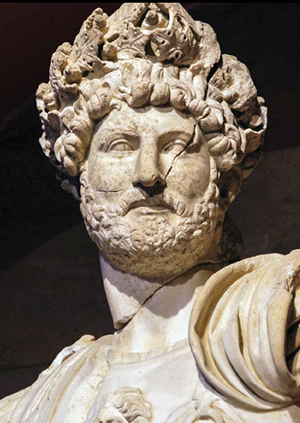
Roman emperor from August 117 untill his death in 138, and successor to Emperor Trajan.

Hadrian came to the throne upon his adoption by Trajan when, it seemed, the latter was on his death bed. Hadrian, however, quickly consolidated his grip on power; his execution of four leading generals who were suspected of plotting against him quickly drove home the message that he entertained no trifle.
A highly intelligent general who hated senatorial politics so much he stayed away from Italy for more than half of his reign, and away from Rome when he was back in his home country. He was also more concerned with consolidating and developing the empire rather than expanding it. The famous Hadrian Wall built across northern Britian, e.g., served as much as a message to his own people that he was keeping Rome out of the north as it served to keep the Scots and Picts out of the Roman south (though there is als a decidedly cynical view suggesting that the massive project served only to keep the Roman army in Britian occupied).
Probably the most significant event of Hadrian's reign, at least from the point of view of the Judaeo-Christian faith, is the outbreak and quelling of the Second Jewish Revolt from 132-135.
He died on 10 July 138, the last of the Nervo-Trajanic dynasty, and was succeeded by Antoninus Pius.

©ALBERITH
u241020lch